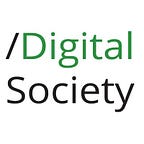Get an account and access Digital Society
How to sign up for Medium and access the course unit publication
We have chosen Medium to make it easy for you to engage with the course (read more about this in our post). We suggest you share ideas on the topics of this module — thus contributing to the module — by writing posts on Medium and responding to others’ posts. For this, you will need a Medium account.
If you cannot access Medium, cannot create an account, or require materials in a different format, please email digisoc@manchester.ac.uk.
If you already have a Medium account, you may use it for this module. Or follow these instructions to create a new account. You may choose to write as yourself, or to use an alias. You can create a Medium account from a Twitter account, which makes sign-in easy. However, if you wish to write anonymously, you may not wish to connect social networks.
Important: Show your account is genuine
Medium has introduced restrictions on new accounts to try and reduce abuse, spam and bots. To reduce the chances your account becomes restricted, please complete the below steps as soon as possible.
- Create an account as soon as you can. Many platforms treat new accounts with suspicion.
- Write a bio (see below for advice).
- Add a profile image. This does not have to be you; you are welcome to write anonymously. It can be any image which you would like to represent you. Please make sure you have permission to use any images you use.
- Follow some publications and writers on Medium. For example, follow the Digital Society publication, course writer and any others of your choosing.
- Associate your account (see the next section in this post). After you do this, we will follow you, which can help too.
All of the above can show that you care about your account, helping to distinguish it from throwaway accounts which can be used for spam/abuse.
You may be interested in how and why platforms decide whether to trust you or not — it is very relevant to this course. If so, the above will give you experience, which you may choose to write about. You could start by asking ‘why’ and ‘how’ for each of the steps above, and then form some opinions, for example who does this affect? Is it fair? Does it even work?
Important for students being assessed: Associate your account
So that we can assess your work, you must create a Medium account and associate it with your username. In UCIL26001/2 in Blackboard, follow the instructions in Assessment. Any problems, email digisoc@manchester.ac.uk.
Access the publication
Digital Society is a Medium publication: a collection of posts by different writers, assembled by an editor. You are reading one of the posts now; you can return to the front page by clicking ‘Digital Society’ at the top-centre of this page. Follow the publication to receive updates.
To receive notifications when new content is added, click ‘Follow’ from the front page of this publication.
We believe in taking the conversation ‘beyond the classroom’ and that we can all learn through discussion; you will contribute to Digital Society on Medium through the comments you make, and your assessed work.
Please note that we do not control or own any tags on Medium, and take no responsibility for content published by other users.
Engaging in conversation on a platform such as Medium is an opportunity for networking. Following people with similar interests is an opportunity to read other people’s ideas, and may lead to useful contacts or discussions.
Decide how to use your Medium account
On Medium, you are a writer without a blog. You are defined by who you are and what you have written, not by the URL or title of a blog. Thus, while you should think about what you will write about, you are free to let this evolve.
Before you publish anything, you should write a short bio (up to 160 characters). You can add a bio by visiting your profile and clicking ‘Edit’.
For example, you could describe: your studies, interests, what you aim to write about (as above, this can evolve). You might write something like:
Undergraduate student in philosophy. Writing about how the digital society affects access to education.
By way of example, below is an example profile for one of the digisoc staff.
← Back: Overview: Online materials | Next: Write for Digital Society →
